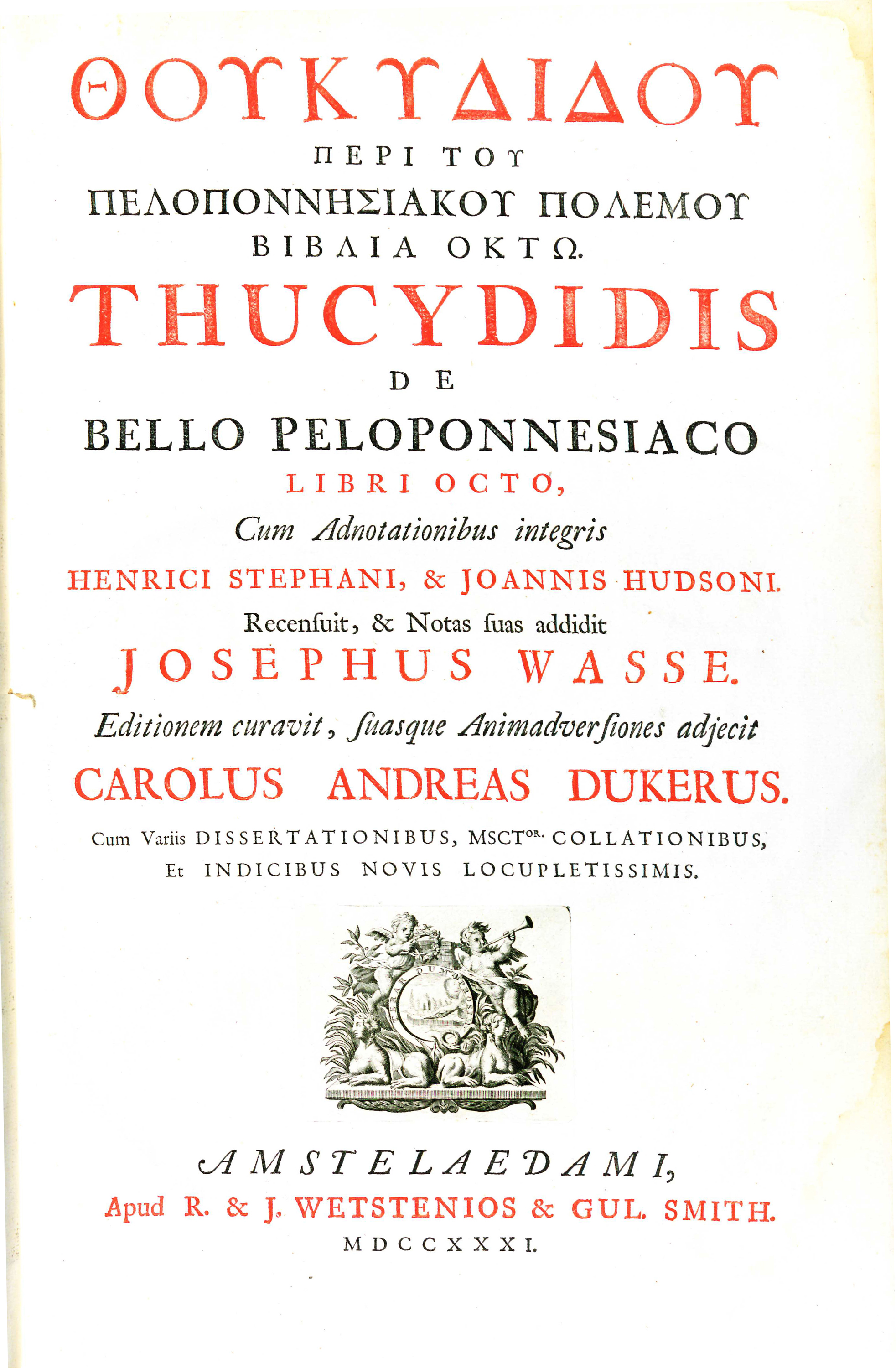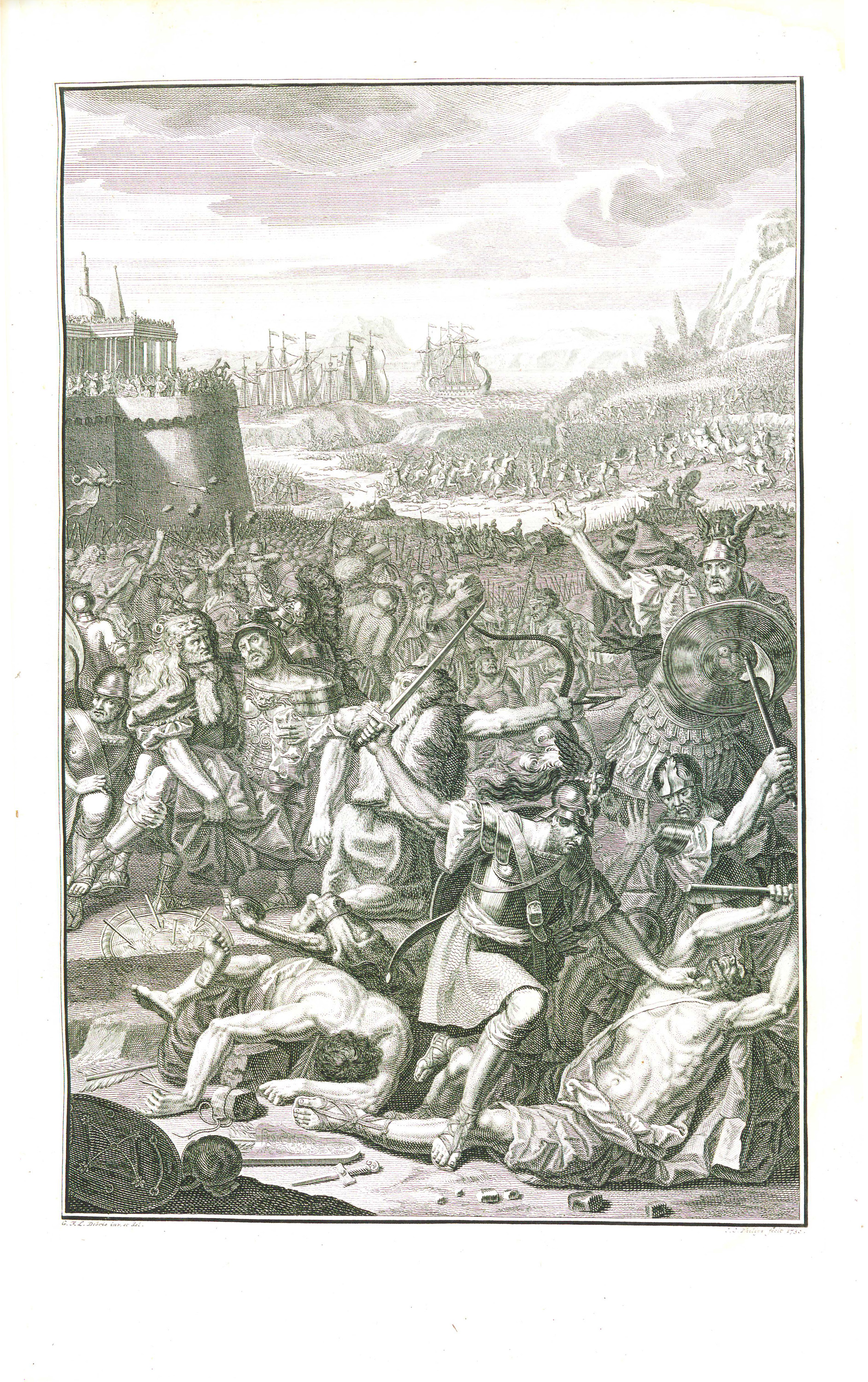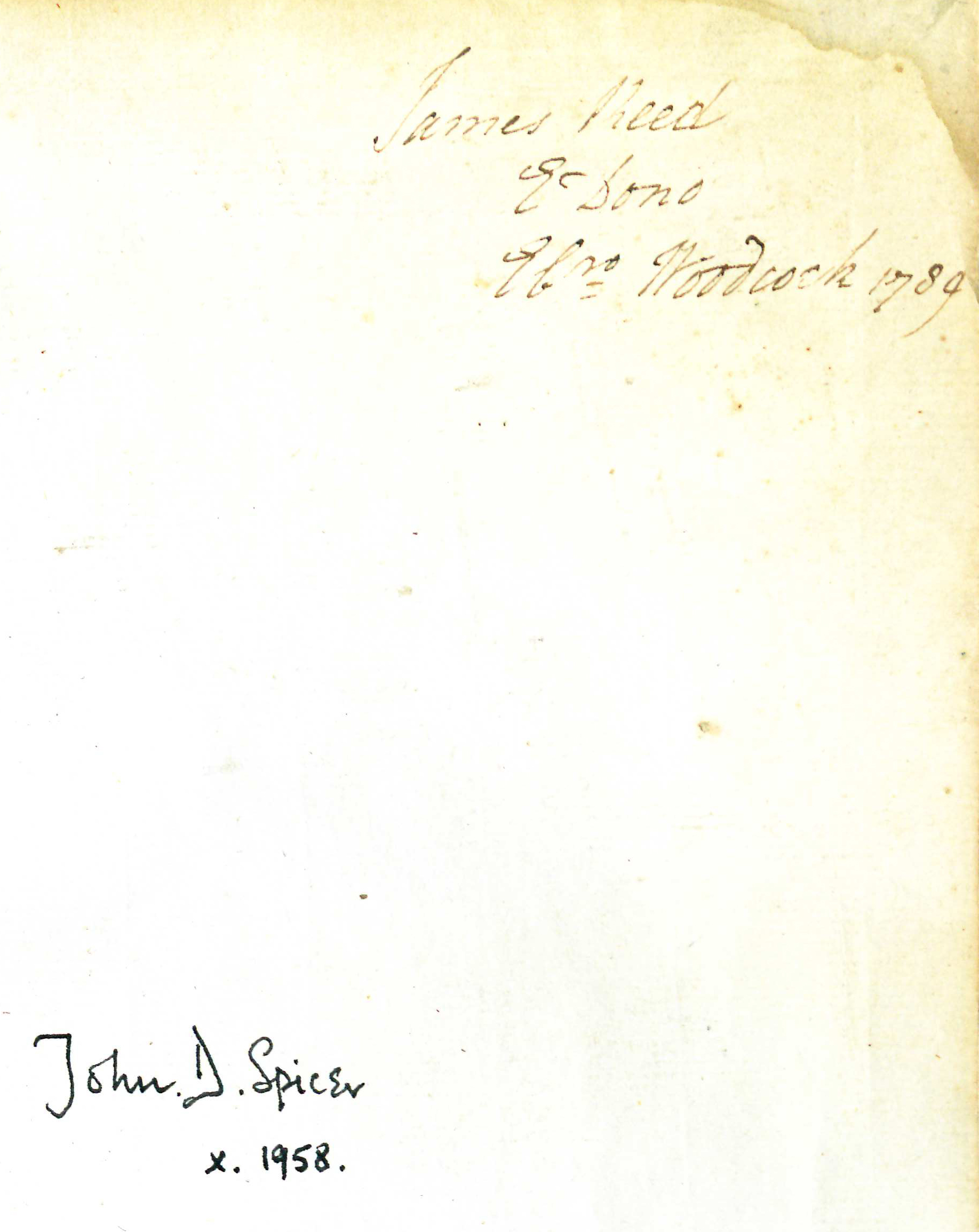Difference between revisions of "Thoukydidou peri tou Peloponnēsiakou Polemou Biblia Oktō"
m (→Evidence for Inclusion in Wythe's Library) |
|||
| (12 intermediate revisions by 6 users not shown) | |||
| Line 4: | Line 4: | ||
{{BookPageInfoBox | {{BookPageInfoBox | ||
|imagename=ThucydidesBelloPeloponnesiaco1731.jpg | |imagename=ThucydidesBelloPeloponnesiaco1731.jpg | ||
| − | |link=https:// | + | |link=https://wm.primo.exlibrisgroup.com/permalink/01COWM_INST/g9pr7p/alma991021554259703196 |
| − | |shorttitle= | + | |shorttitle=History of the Peloponnesian War |
| − | |author=Thucydides | + | |author=[[:Category:Thucydides|Thucydides]] |
|editor=Henricus Stephanus | |editor=Henricus Stephanus | ||
| − | |lang=Ancient Greek | + | |lang=[[:Category:Greek|Ancient Greek]] |
| − | |publoc=Amstelædami | + | |publoc=[[:Category:Amsterdam|Amstelædami]] |
|publisher=Apud R. & J. Wetstenios & Gul. Smith. | |publisher=Apud R. & J. Wetstenios & Gul. Smith. | ||
|year=1731 | |year=1731 | ||
|pages=[38], 728, 48, 123, [1] | |pages=[38], 728, 48, 123, [1] | ||
| − | |desc=Folio (40 cm.) | + | |desc=[[:Category:Folios|Folio (40 cm.)]] |
| − | |shelf=N- | + | |shelf=N-5 |
| − | }}[[File:ThucydidesThoukydidouPeriTouPeloponnesiakou1731Illustration.jpg|left|thumb|250px|<center>Illustration.</center>]][http://en.wikipedia.org/wiki/Thucydides Thucydides] (c. 460 BCE–c. 395 BCE) has gone down in history as one of the great ancient historians, despite the fact that (possibly because) he wrote only one book: ''History of the Peloponnesian War''.<ref>John Roberts, ed., "[http://www.oxfordreference.com/view/10.1093/acref/9780192801463.001.0001/acref-9780192801463-e-2194 Thucydidēs]" in ''Oxford Dictionary of the Classical World'' (Oxford: Oxford University Press, 2007).</ref> The ''History'' consists of eight books, roughly divided into five parts or themes that cover [http://en.wikipedia.org/wiki/Peloponnesian_War the war between Athens and Sparta] (431-404 BCE) until the winter of 411/410 BCE. Continuations by other historians to complete Thucydides’ history of the war are now lost, and the original portions of the eight books are also not complete.<ref>Ibid.</ref | + | }}[[File:ThucydidesThoukydidouPeriTouPeloponnesiakou1731Illustration.jpg|left|thumb|250px|<center>Illustration.</center>]][http://en.wikipedia.org/wiki/Thucydides Thucydides] (c. 460 BCE–c. 395 BCE) has gone down in history as one of the great ancient historians, despite the fact that (possibly because) he wrote only one book: ''History of the Peloponnesian War''.<ref>John Roberts, ed., "[http://www.oxfordreference.com/view/10.1093/acref/9780192801463.001.0001/acref-9780192801463-e-2194 Thucydidēs]" in ''Oxford Dictionary of the Classical World'' (Oxford: Oxford University Press, 2007).</ref> The ''History'' consists of eight books, roughly divided into five parts or themes that cover [http://en.wikipedia.org/wiki/Peloponnesian_War the war between Athens and Sparta] (431-404 BCE) until the winter of 411/410 BCE. Continuations by other historians to complete Thucydides’ history of the war are now lost, and the original portions of the eight books are also not complete.<ref>Ibid.</ref> |
| − | + | ||
Thucydides intended his history to be used as instructive and accurate record of what he viewed as the most important war in Greek history. In 424 BCE, as a general or ''strategos'', Thucydides failed to save the valuable Athenian colony of [http://en.wikipedia.org/wiki/Amphipolis Amphipolis] from Spartan attack. As a result, he was exiled and did not return to Athens until 404 BCE. His absence for most of the Peloponnesian War inspired him “to gain first-hand information from both sides and to have a clearer perspective.”<ref>M.C. Howatson, ed., "[http://www.oxfordreference.com/view/10.1093/acref/9780199548545.001.0001/acref-9780199548545-e-2939 Thūcy'didēs] in ''The Oxford Companion to Classical Literature'' (Oxford: Oxford University Press, 2011).</ref> Though Thucydides strived for “exactness,” he also used a great many speeches in his history, and admitted that it was near impossible to have fully accurate speeches. In these situations, Thucydides allowed himself to trust his “historical imagination” in order to dramatically demonstrate “the workings of men’s minds and the impact of circumstance.” <ref>Roberts, "Thucydidēs."</ref> His focus on accuracy is seen through the lack of divine explanations for any events, but his impartiality has been questioned, especially in reference to his favorable view of [http://en.wikipedia.org/wiki/Pericles Pericles] and unjustifiably negative depiction of [http://en.wikipedia.org/wiki/Cleon Cleon]. Overall, the serious nature of the writing illuminates Thucydides’ focus on historical fact and analysis.<ref>Howatson, "Thūcy'didēs.”</ref> | Thucydides intended his history to be used as instructive and accurate record of what he viewed as the most important war in Greek history. In 424 BCE, as a general or ''strategos'', Thucydides failed to save the valuable Athenian colony of [http://en.wikipedia.org/wiki/Amphipolis Amphipolis] from Spartan attack. As a result, he was exiled and did not return to Athens until 404 BCE. His absence for most of the Peloponnesian War inspired him “to gain first-hand information from both sides and to have a clearer perspective.”<ref>M.C. Howatson, ed., "[http://www.oxfordreference.com/view/10.1093/acref/9780199548545.001.0001/acref-9780199548545-e-2939 Thūcy'didēs] in ''The Oxford Companion to Classical Literature'' (Oxford: Oxford University Press, 2011).</ref> Though Thucydides strived for “exactness,” he also used a great many speeches in his history, and admitted that it was near impossible to have fully accurate speeches. In these situations, Thucydides allowed himself to trust his “historical imagination” in order to dramatically demonstrate “the workings of men’s minds and the impact of circumstance.” <ref>Roberts, "Thucydidēs."</ref> His focus on accuracy is seen through the lack of divine explanations for any events, but his impartiality has been questioned, especially in reference to his favorable view of [http://en.wikipedia.org/wiki/Pericles Pericles] and unjustifiably negative depiction of [http://en.wikipedia.org/wiki/Cleon Cleon]. Overall, the serious nature of the writing illuminates Thucydides’ focus on historical fact and analysis.<ref>Howatson, "Thūcy'didēs.”</ref> | ||
==Evidence for Inclusion in Wythe's Library== | ==Evidence for Inclusion in Wythe's Library== | ||
| − | Listed in the [[Jefferson Inventory]] of [[Wythe's Library]] as | + | |
| + | Listed in the [[Jefferson Inventory]] of [[Wythe's Library]] as "[Th]ucydides Gr. Lat. notis variorum. Dukeri fol." This was one of the titles kept by [[Thomas Jefferson]] and later sold to the Library of Congress in 1815. Both [http://www.librarything.com/profile/GeorgeWythe George Wythe's Library]<ref>''LibraryThing'', s.v. "[http://www.librarything.com/profile/GeorgeWythe Member: George Wythe]," accessed on November 19, 2013.</ref> on LibraryThing and the [https://digitalarchive.wm.edu/handle/10288/13433 Brown Bibliography]<ref>Bennie Brown, "The Library of George Wythe of Williamsburg and Richmond," (unpublished manuscript, May, 2012) Microsoft Word file. Earlier edition available at: https://digitalarchive.wm.edu/handle/10288/13433.</ref> list the 1731 edition published in Amsterdam. This is also the edition Millicent Sowerby's included in ''Catalogue of the Library of Thomas Jefferson'',<ref>E. Millicent Sowerby, ''Catalogue of the Library of Thomas Jefferson'', (Washington, D.C.: The Library of Congress, 1952-1959), 1:8 [http://babel.hathitrust.org/cgi/pt?id=mdp.39015033648091;view=1up;seq=38 [no.15]].</ref> but, Jefferson's copy no longer exists. The Wolf Law Library chose to add the edition suggested by Sowerby, Brown, and LibraryThing. | ||
[[File:ThucydidesThoukydidouPeriTouPeloponnesiakou1731Inscription.jpg|left|thumb|250px|<center>Inscriptions, front free endpaper.</center>]] | [[File:ThucydidesThoukydidouPeriTouPeloponnesiakou1731Inscription.jpg|left|thumb|250px|<center>Inscriptions, front free endpaper.</center>]] | ||
==Description of the Wolf Law Library's copy== | ==Description of the Wolf Law Library's copy== | ||
| + | |||
Bound in contemporary blind-stamped Dutch vellum with spine lettered in ink. Includes signature of "John D. Spicer, 1958" and the inscription "James Reed ex bono E.C.(?) Woodcock, 1789." Purchased from Blackwell's Rare Books. | Bound in contemporary blind-stamped Dutch vellum with spine lettered in ink. Includes signature of "John D. Spicer, 1958" and the inscription "James Reed ex bono E.C.(?) Woodcock, 1789." Purchased from Blackwell's Rare Books. | ||
| − | View the record for this book in [https:// | + | Images of the library's copy of this book are [https://www.flickr.com/photos/wolflawlibrary/sets/72157659136879598 available on Flickr.] View the record for this book in [https://wm.primo.exlibrisgroup.com/permalink/01COWM_INST/g9pr7p/alma991021554259703196 William & Mary's online catalog.] |
==See also== | ==See also== | ||
| + | <div style="overflow: hidden;"> | ||
*[[George Wythe Room]] | *[[George Wythe Room]] | ||
| − | *''[[History of the Peloponnesian War]'' | + | *''[[History of the Peloponnesian War|The History of the Peloponnesian War]]'' |
| + | *[[Jefferson Inventory]] | ||
*[[Wythe's Library]] | *[[Wythe's Library]] | ||
| + | </div> | ||
==References== | ==References== | ||
| + | <div style="overflow: hidden;"> | ||
<references/> | <references/> | ||
| + | </div> | ||
==External Links== | ==External Links== | ||
| Line 41: | Line 48: | ||
[[Category:Ancient History]] | [[Category:Ancient History]] | ||
[[Category:George Wythe Collection at William & Mary's Wolf Law Library]] | [[Category:George Wythe Collection at William & Mary's Wolf Law Library]] | ||
| + | [[Category:Jefferson's Books]] | ||
| + | [[Category:Thucydides]] | ||
[[Category:Titles in Wythe's Library]] | [[Category:Titles in Wythe's Library]] | ||
| + | |||
| + | [[Category:Amsterdam]] | ||
| + | [[Category:Folios]] | ||
| + | [[Category:Greek]] | ||
Latest revision as of 11:35, 23 June 2023
by Thucydides
| History of the Peloponnesian War | |
|
Title page from History of the Peloponnesian War, George Wythe Collection, Wolf Law Library, College of William & Mary. | |
| Author | Thucydides |
| Editor | Henricus Stephanus |
| Published | Amstelædami: Apud R. & J. Wetstenios & Gul. Smith. |
| Date | 1731 |
| Language | Ancient Greek |
| Pages | [38], 728, 48, 123, [1] |
| Desc. | Folio (40 cm.) |
| Location | Shelf N-5 |
Thucydides intended his history to be used as instructive and accurate record of what he viewed as the most important war in Greek history. In 424 BCE, as a general or strategos, Thucydides failed to save the valuable Athenian colony of Amphipolis from Spartan attack. As a result, he was exiled and did not return to Athens until 404 BCE. His absence for most of the Peloponnesian War inspired him “to gain first-hand information from both sides and to have a clearer perspective.”[3] Though Thucydides strived for “exactness,” he also used a great many speeches in his history, and admitted that it was near impossible to have fully accurate speeches. In these situations, Thucydides allowed himself to trust his “historical imagination” in order to dramatically demonstrate “the workings of men’s minds and the impact of circumstance.” [4] His focus on accuracy is seen through the lack of divine explanations for any events, but his impartiality has been questioned, especially in reference to his favorable view of Pericles and unjustifiably negative depiction of Cleon. Overall, the serious nature of the writing illuminates Thucydides’ focus on historical fact and analysis.[5]
Evidence for Inclusion in Wythe's Library
Listed in the Jefferson Inventory of Wythe's Library as "[Th]ucydides Gr. Lat. notis variorum. Dukeri fol." This was one of the titles kept by Thomas Jefferson and later sold to the Library of Congress in 1815. Both George Wythe's Library[6] on LibraryThing and the Brown Bibliography[7] list the 1731 edition published in Amsterdam. This is also the edition Millicent Sowerby's included in Catalogue of the Library of Thomas Jefferson,[8] but, Jefferson's copy no longer exists. The Wolf Law Library chose to add the edition suggested by Sowerby, Brown, and LibraryThing.
Description of the Wolf Law Library's copy
Bound in contemporary blind-stamped Dutch vellum with spine lettered in ink. Includes signature of "John D. Spicer, 1958" and the inscription "James Reed ex bono E.C.(?) Woodcock, 1789." Purchased from Blackwell's Rare Books.
Images of the library's copy of this book are available on Flickr. View the record for this book in William & Mary's online catalog.
See also
References
External Links
Read this book in Google Books.


